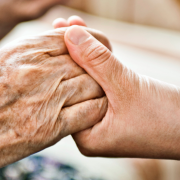What Causes Parkinson’s Disease? Many Answers
What Causes Parkinson’s Disease?
A Shortage of Dopamine
Parkinson’s disease occurs when nerve cells, or neurons, in an area of the brain that controls movement become impaired and/or die. Normally, these neurons produce an important brain chemical known as dopamine, but when the neurons die or become impaired, they produce less dopamine. This shortage of dopamine causes the movement problems of people with Parkinson’s.
Dopamine is a chemical messenger, or neurotransmitter. Dopamine is responsible for transmitting signals between the substantia nigra and multiple brain regions. The connection between the substantia nigra and the corpus striatum is critical to produce smooth, purposeful movement. Loss of dopamine in this circuit results in abnormal nerve-firing patterns within the brain that cause impaired movement.
Loss of Norepinephrine
People with Parkinson’s also have loss of the nerve endings that produce the neurotransmitter norepinephrine. Norepinephrine, which is closely related to dopamine, is the main chemical messenger of the sympathetic nervous system. The sympathetic nervous system controls many automatic functions of the body, such as heart rate and blood pressure. The loss of norepinephrine might help explain several of the non-movement features of Parkinson’s, such as fatigue, irregular blood pressure, decreased gastric motility or movement of food through the digestive tract, and postural hypotension. Postural hypotension is a sudden drop in blood pressure when a person stands up from a sitting or lying-down position. It may cause dizziness, lightheadedness, and in some cases, loss of balance or fainting.
Genetic Mutations
Although some cases of Parkinson’s appear to be hereditary, and a few can be traced to specific genetic mutations, most cases are sporadic. Sporadic means the disease occurs randomly and does not seem to run in families. Many researchers now believe that Parkinson’s disease results from a combination of genetic and environmental factors.
What Causes Parkinson’s Disease?
What Causes Parkinson’s Disease?
A Shortage of Dopamine
Parkinson’s disease occurs when nerve cells, or neurons, in an area of the brain that controls movement become impaired and/or die. Normally, these neurons produce an important brain chemical known as dopamine, but when the neurons die or become impaired, they produce less dopamine. This shortage of dopamine causes the movement problems of people with Parkinson’s.
Tips for Communicating to Seniors with Dementia
Depending on what stage of dementia your loved one is in, sometimes communication can be a challenge for family members. Dementia can cause mood swings or possibly change their personality and behavior. Here are a few tips to help you connect with a person with dementia.
Realize your challenge
There will always be good days and bad days for those with dementia. Don’t let a few bad interactions discourage you from trying again.
Be patient
Tolerate compassionately any delays or provocation. Dementia isn’t easy but what can make a huge difference in interactions is having patience.
Minimize noise
Loud music, movies, or even construction outside can disturb and confuse people with dementia.
Avoid arguing
Go with the flow and do not contradict people with dementia. Telling them they’re wrong may have a negative effect.
Slow Down
Talk and interact in a relaxed manner. Enable the person to do things for themselves, even if it’s small. Try to keep things simple.
If you need something more than a few tips and you’re considering senior care services in the Tucker, GA area outside of Atlanta, contact us here and discover the Orchard difference.
Do Seniors Need A Living Will?
What is a living will?
Talking about end-of-life and critical-care issues are never an easy subject and can often get pushed aside because family members aren’t ready to confront this stage, but planning ahead can avert confusion and unnecessary distress during times of concern and grief.
Knowing a loved one’s wishes in advance before an illness or accident ensures that family members won’t have to make tough calls on their behalf during a crisis.
Livings Wills Are Legal Instructions
Also called advance directives or healthcare directives, living wills are written, legal instructions detailing a person’s preferences for medical care if they are unable to make decisions. Advance directives manage healthcare choices for medical professionals and caregivers if a person is terminally ill, critically injured, in a coma, in the late stages of dementia or near the end of life.
Living Wills and Power of Attorney
A living will typically work together with a medical power of attorney (POA). Some states combine the two into one document. The medical POA enables a person to select a person (a spouse, family member, or a friend) to make medical decisions on their behalf.
This isn’t just for older adults either, unexpected critical care and end-of-life situations can occur at any age, it’s crucial for all adults to prepare these documents. For more helpful information for seniors, read more articles on our blog here. To contact the Orchard for assisted living click here to speak to a representative.
What is Hospice Care?
There are many misconceptions about hospice care, and those misunderstandings can prevent people from taking advantage of helpful services that could improve the quality of life for seniors and their families. To start off, hospice is not a “place”, it is a combination of specialized services to help patients and families cope with a terminal illness.
Hospices specialize in serving patients with a terminal illness. While these illnesses are not curable, a lot can be done to make the patient’s life more comfortable and help them do things that are important to them at this stage of their life.
Hospice care is personalized for every patient and family. It focuses on improving and maintaining patients’ and their families’ quality of life. Hospice helps individuals to live as well as possible through expertly managing pain and other symptoms they experience.
Most people who have a terminal illness are eligible for hospice care and have their care paid for by Medicaid, Medicare, Veteran’s Benefits, or private insurance.
Orchard hospice care supports patients with a terminal illness and their families by providing services such as:
- Expert guidance and support for those caring for the patient, including information about the patient’s condition, their medications, and how to best care for the patient’s medical and personal care needs.
- Needed medications, medical equipment and supplies.
- Coordination of the patient’s care and medications with all of the patient’s medical providers, including the patient’s own doctors, hospice doctors, nurses, and other staff.
- Emotional and spiritual support for both the patient and their family during this phase of life. This includes help for the family before and after the patient dies.
By partnering with local Hospice providers in Tucker and the surrounding Georgia area, Orchard has dedicated itself to offering the most comfortable facilities, excellent team members, and amenities that will make that final transition to end of life care as comfortable as possible. Hospice services may also be provided onsite.
To learn more about our Hospice Care, contact Orchard here or call (770) 938-5600.

 About 60,000 Americans are diagnosed with Parkinson’s disease each year. The disease strikes more men than women. The average age of onset is 60 years, and the risk of developing the disease increases with age. Parkinson’s disease is also more common in developed countries, possibly because of increased exposure to pesticides or other environmental toxins
About 60,000 Americans are diagnosed with Parkinson’s disease each year. The disease strikes more men than women. The average age of onset is 60 years, and the risk of developing the disease increases with age. Parkinson’s disease is also more common in developed countries, possibly because of increased exposure to pesticides or other environmental toxins


